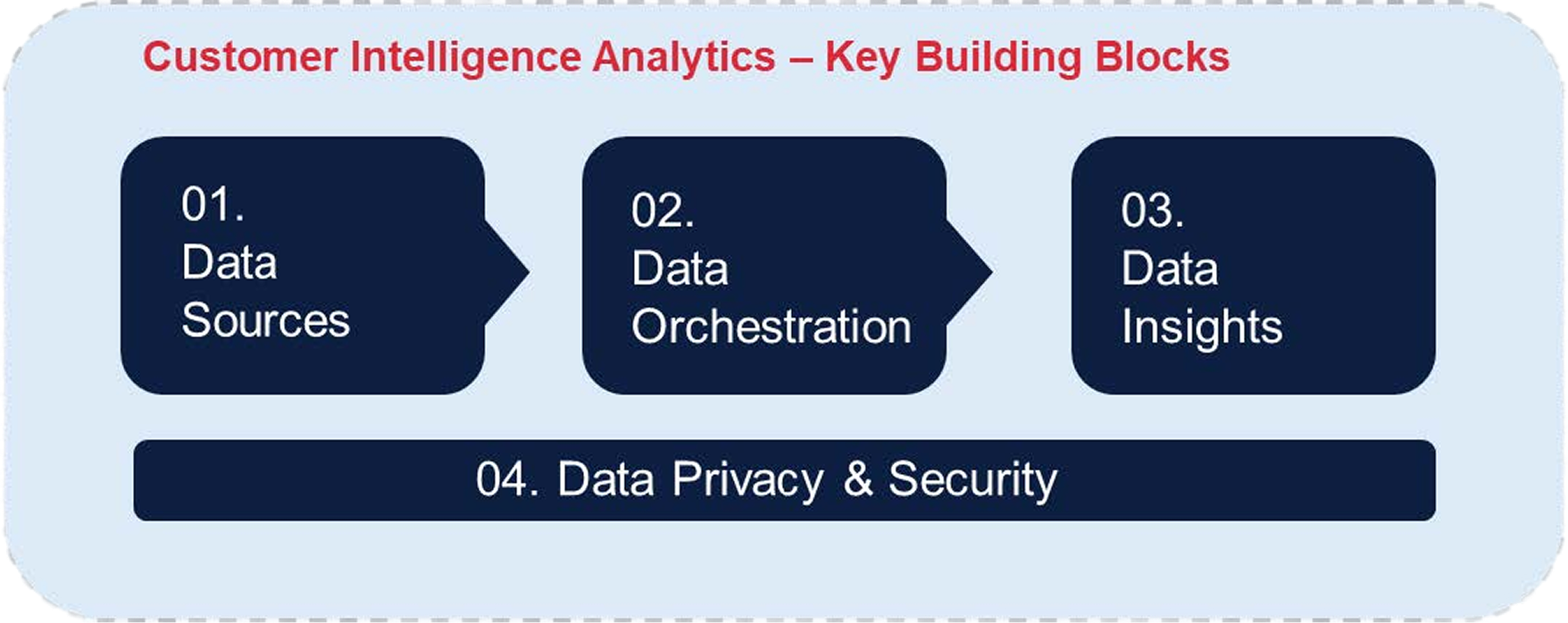OurPerspectives:CustomerIntelligence
Introduction
In today's hyper-connected digital landscape, businesses are inundated with vast amounts of data. From online transactions and social media interactions to customer feedback and website analytics, the wealth of information available can be overwhelming. Understanding what matters most is essential...
Customer Intelligence is the process of collecting, analyzing, and interpreting this data to illuminate customer behaviors, preferences, and needs. This understanding helps you make informed decisions about products, services, and marketing strategies that will resonate with your audience.
Customer Intelligence goes beyond traditional metrics, delving into deep insights and predictions to provide a comprehensive view of the customer journey, from initial awareness to long-term loyalty.
Figure below illustrates some of the key benefits of customer intelligence across critical business areas:

Customer Intelligence Advantage
Customer intelligence empowers you to make data-driven decisions that drive revenue, improve profitability, and build lasting customer relationships. Below are some the key benefits:
- Identify upselling and crossselling opportunities.
- Identify high-value customers and market segments and tailor growth campaigns to unlock untapped potential within the customer base.
- Identify at-risk customers through predictive analytics, allowing for timely intervention strategies to improve retention.
- Proactively address customer pain points through automated monitoring of customer satisfaction levels.
- Optimize resource allocation by identifying the most profitable customer segments and channels.
- Identify pricing strategies and cost savings to maximize profitability.
- Anticipate market shifts and stay ahead of the curve.
- Make informed decisions about future product development and market expansion.
- Personalize the customer journey across all touchpoints.
- Deliver targeted messaging and offers that resonate with individual customers.
The Big Picture Roadmap
The roadmap to creating customer intelligence insights consists of four key stages. Each stage builds upon the previous to establish a strong foundation for long-term success.

Key Metrics
Data collection is a fundamental pillar of customer intelligence. The following key metrics, categorized by their contribution to crucial business areas, lay the foundation for powerful Customer Intelligence Insights:
Category | Sample Signal Metrices |
|---|---|
Revenue Expansion | Company Growth, Product/Service Adoption, Underutilized Offerings, Potential Upgrade Indicators (Usage, Feature Requests, etc.) |
Churn Management | Net Promoter Score, Service Level Needs, Growth Rate, Customer Engagement, Financial Health |
Profitability Insights | Profit Margin per Customer, Cost to Service, Average Revenue per User, Customer Lifetime Value, Customer Acquisition Costs |
Strategic Forecasting | Revenue Forecast, Cost to Serve, Customer Lifetime Value Trends, Resource Utilization Trends, New Technologies |
Digital Marketing | Conversion Rates, Social Media Engagement, Website Traffic, Customer Acquisition Costs, New Pipeline Trends |
Implementing in Action

The four key steps above provide a roadmap to develop and deploy an effective customer intelligence analytics platform. As AI-powered automation evolves quickly, it's important for companies to keep up with the latest advancements to improve and expand their capabilities continuously.

Challenges & Considerations
Understanding the challenges is crucial for businesses to leverage the full potential of customer intelligence effectively. Below are four key considerations:
Data Privacy
Ensure customer data is collected, stored, and processed in compliance with global and local data privacy regulations. Navigate a complex landscape of regulations such as GDPR, CCPA, and others.
Data Limitations
The quality, completeness, and relevance of data directly influence the insights. Data limitations, such as incomplete datasets, biased data, or outdated information, can lead to misleading insights.
Data Privacy
Ensure customer data is collected, stored, and processed in compliance with global and local data privacy regulations. Navigate a complex landscape of regulations such as GDPR, CCPA, and others.
Data Limitations
The quality, completeness, and relevance of data directly influence the insights. Data limitations, such as incomplete datasets, biased data, or outdated information, can lead to misleading insights.
Data Transparency
Ensure transparency in how customer data is utilized and how insights are derived. This is crucial for maintaining trust with stakeholders, including customers and internal users
AI Readiness
Complex data sources often require a human component, making fully automated solutions challenging. It’s important to be cautious of promises that seem too good to be true, such as one-click solutions or complete automation.
Takeaways
A comprehensive customer intelligence platform is an invaluable tool for businesses, providing essential insights that lead to improved customer satisfaction, increased revenue, and healthier margins. Companies employing such tools ultimately solidify their position as valued partners to their customers.
As businesses evolve to meet changing consumer trends and behaviors, the importance of customer intelligence will only continue to grow. By embracing a data-driven approach and investing in advanced analytics capabilities, businesses can prioritize the right customers and identify those most likely to drive long-term, protable growth.
The key to staying ahead in the market is understanding your customers better than anyone else. Through customer intelligence, you uncover the hidden gems of market opportunities that others overlook.
